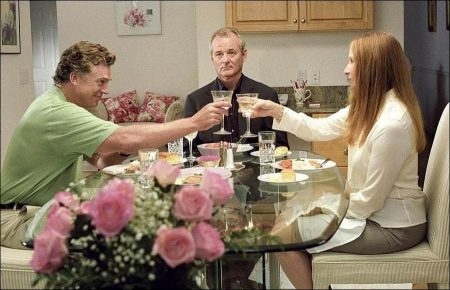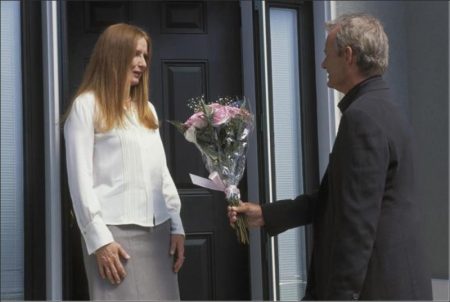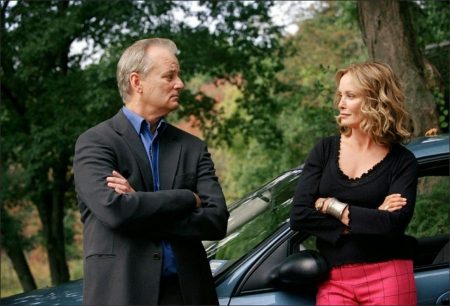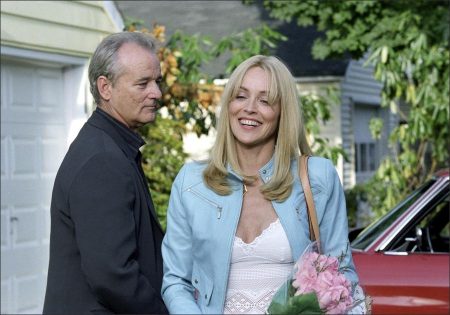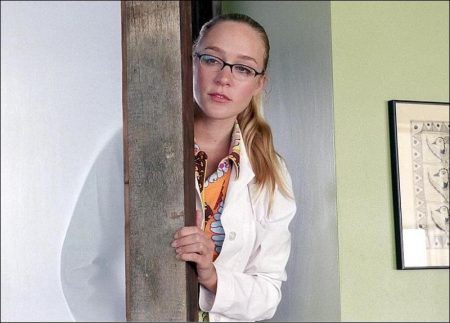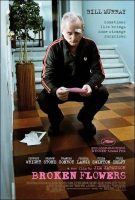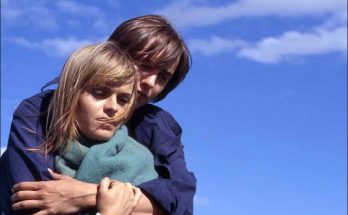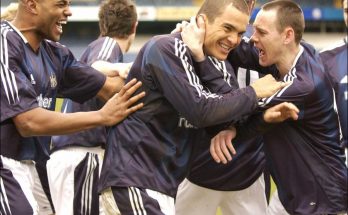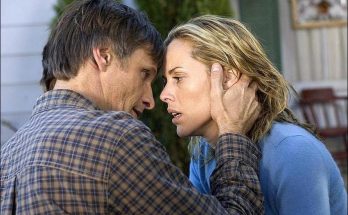Broken Flowers Movie Trailer. The resolutely single Don Johnston has just been dumped by his latest lover, Sherry. Don resigns himself to being alone yet again and left to his own devices. Instead, he is compelled to reflect on his past when he receives by mail a mysterious pink letter. It is from an anonymous former lover and informs him that he has a 19-year-old son who may now be looking for his father.
Don is urged to investigate this “mystery” by his closest friend and neighbor, Winston, an amateur sleuth and family man. Hesitant to travel at all, Don nonetheless embarks on a cross-country trek in search of clues from four former flames. Unannounced visits to each of these unique women hold new surprises for Don as he haphazardly confronts both his past and, consequently, his present.
Interview with Jim Jarmusch
Q: The beginning of this movie carries a dedication to Jean Eustache. How, as a filmmaker, did Eustache inspire you; did he inspire this particular story?
Jim Jarmusch: I have varied reasons for the dedication. He was an inspiration on a certain level, though not a direct one. His film The Mother and the Whore is one of the more beautiful films about male/female miscommunication, and there’s an element of that in our film. So there was only some minor connection to him in content. And stylistically, our film is not like Eustache at all.
The other reason is that the spirit in which he made films was completely true to himself and what he wanted to say with cinema. The Mother and the Whore is a three-and-a-half hour film, a great French film that’s not even available in France on DVD or video – which I find shocking and disappointing. There’s something in him that I want to carry in myself: making a film the way you choose to make it, true to yourself without being concerned with the marketplace or anyone’s expectations – just the pure spirit of wanting to express something in your own style. That’s very important to me.
At first I felt, well, maybe it’s pretentious to dedicate my film to him. But, you know, I think if three young film viewers somewhere in Japan, or Hungary, or Kansas, or somewhere, see the film and they’re not aware of Jean Eustache and they find out about his work – he made very few films, only four – then I would feel like, okay, that was worth it then. That would be enough to make me happy.
Q: As for Broken Flowers, with regard to the letter which initiates the story, whose penmanship was on the envelope?
Jim Jarmusch: It’s Sandy Hamilton, our incredible prop master; he’s very meticulous. It was such a gift to work with this crew, and all of these people – Mark Friedberg, our designer; Fred Elmes, the DP…I’ve mentioned only 3, out of maybe 60; grips, gaffers, interns, the craft service guys – they were all just amazing.
Q: You’ve worked with Bill Murray before, just a couple of years ago, on the “Delirium” segment of Coffee and Cigarettes. Did you craft this film specifically for him?
Jim Jarmusch: Yeah. In writing the script, I wasn’t consciously trying to write it imagining him saying the lines, exactly; I was using a certain side of Bill, and I wanted to create a character where he wasn’t reliant on things we expect or know or appreciate from Bill Murray – his ability to make things hilarious. I wanted that other side; he’s always had that balance of mischief and melancholy – that’s Bill Murray. It’s that very rare thing he has. So I kind of wanted to create something that could give a little more weight to that other side of his abilities as an actor. He liked the script, so I went forward from there based on his availability as to when to shoot it.
Q: The Coffee and Cigarettes segments were like riffs, and this was more like a full-on movement.
Jim Jarmusch: Yes, and it’s a complicated character for an actor. Because Don isn’t a character that you’re intended to connect with immediately. He’s disconnected himself, but the empathy accumulates. It was a tricky thing for Bill. He did such a beautiful job, and brought to it.
Q: How did you approach the actresses, most of whom hadn’t worked with you before like Bill had? Did they all see all of the script, or just their scenes?
Jim Jarmusch: The four main ones – Frances, Jessica, Sharon, Tilda – saw the complete script. What I did with them was to have each one write a letter – the letter – so that I could plant in their minds the possibility of each being the mother of this son. I wanted them to write in-character. I saved the letters, which were beautiful and each very different. That was the first insight into their characters between me and them. And then, for the filming, I rewrote the letter, using pieces of their own language, pulling things from their letters.
Q: In this movie, you got Jessica Lange and Bill Murray into another movie together, 23 years after Tootsie. Actually, I don’t think they have any scenes together in that movie –
Jim Jarmusch: No, but I think they were on the Tootsie set. They did meet, and knew each other from that time.
Q: So what was the dynamic like between them now?
Jim Jarmusch: Bill was very respectful and excited to work with Jessica on this. And Jessica seemed pretty particular about maintaining her character as much as possible while working. Her – Carmen’s – letter to Don was really funny; she said in her letter, “Under no circumstances will you insult or do anything rude toward this boy, if he does appear.” [laughs] So I kind of took a lead from that on how to work with her as this character, and let her keep that resentment toward Don.
Jessica is a class act; she was very warm and lovely with all of us. I would occasionally tease her by saying, “Let’s not forget, you were the Acid Queen of San Francisco in 1968!” I’d try to make her laugh at some points to break tension, being appreciative of what she was going through – what any actor goes through – to be a pretend person on command, with a lot of history that’s all made up in their head. It’s a difficult thing.
Q: One of the surprising sequences in the film is where Don visits Laura (Sharon Stone) and meets Lolita (Alexis Dziena). How did you stoke the chemistry among these three?
Jim Jarmusch: We didn’t rehearse, but we all carefully went over the scenes together – hung out in Sharon’s trailer for a few hours – and talked through them. I did try to get a playfulness going, because it’s the first stop on Don’s journey – and the least abrasive for him, emotionally. Laura is not a victim, yet there’s a lot of tiny sad things about her that Sharon was aware of and helped to bring out. We tried to get that tone of what we wanted the scenes to feel like, what the mood would be. I never wanted to talk about the meaning of the scenes, because it means different things to each character.
Alexis was great. She was quite literal; she wanted to talk with me about each line and what they meant. She was concerned about showing that while Lolita is, on one level, teasing Don in a sexual way, she’s really trying to show a stranger who had a connection to her mother that there’s something missing for her in terms of a father figure.
And Sharon added some beautiful things. It was Sharon’s idea to be smashed up on top of Don in bed when they wake up in the morning; it was Sharon’s idea to, on leaving, kiss his hand. Her idea was, “What if we reverse the traditional gesture of a man kissing a woman’s hand, and I just take his hand and briefly kiss it in a little gesture to leave him with, showing that I’m not needy or devastated but that I’m appreciating a tender thing that happened between us, and whatever it means is okay.” And that was a perfect solution. I know it’s just a small thing, but all those add up in the film, so they were all considered as we went along.
Q: The other significant male role in the movie, besides Bill’s, is the part of Winston. Did you script the character with Jeffrey Wright in mind, and did the two actors meet up beforehand?
JJ: They didn’t, really. They only met when we first were doing wardrobe stuff and some test footage. That’s the first time I got to have them together.
I did have Jeffrey in my head while I was writing Winston, although Jeffrey’s such an incredible chameleon that it wasn’t any particular part of Jeffrey, except his ability to embody a character that I wanted to not be a stereotype. I wrote hoping he would be interested in creating the character based on what I had written – which he did.
While we were shooting, Jeffrey sometimes would be on his cell phone right before we shot a scene. At one point, I was disturbed and said, “Jeffrey, is everything okay? You were on the phone –” And he’s like, “Yeah yeah, no no; I call the Ethiopian Embassy all the time, and I make up questions to ask them out of the blue, just so I can hear the guy’s accent on the phone.”
We had talked a lot about an Ethiopian accent; it’s a little different from a generic – if there is such a thing – North African accent, and has a slight touch of South Asian to it. Jeffrey’s very meticulous, so he’d be on the phone asking the guy, “Are there any troubles on the Western border?” “No, I don’t know of anything. Why are you asking?” “Oh, I…” Jeffrey would hear the guy, hang up, and go, “Okay, I’m ready.” But, at first, I didn’t know who the hell he was talking to.
Broken Flowers (2005)
Directed by: Jim Jarmusch
Starring: Bill Murray, Frances Conroy, Julie Delpy, Jessica Lange, Sharon Stone, Tilda Swinton, Jeffrey Wright. Chloë Sevigny, Alexis Dziena, Nicole Abisinio, Zakira Holland
Screenplay by: Jim Jarmusch
Production Design by: Mark Friedberg
Cinematography by: Frederick Elmes
Film Editing by: Jay Rabinowitz
Costume Design by: John Dunn
Set Decoration by: Lydia Marks
Art Direction by: Sarah Frank
Music by: Mulatu Astatke
MPAA Rating: R for language, some graphic nudity and brief drug use.
Distributed by: Focus Features
Release Date: August 5, 2005
Views: 267
